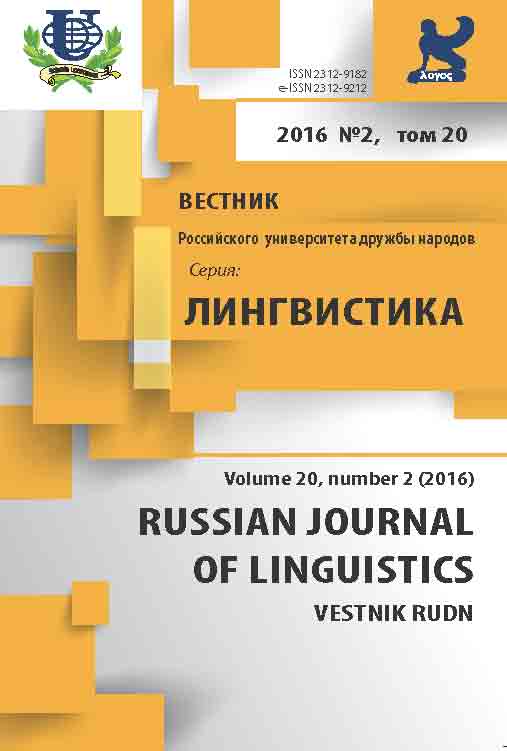Precedent Phenomena in Quebecois Linguistic World View
- Authors: Bolotina K.E.1
-
Affiliations:
- Peoples’ Friendship University of Russia
- Issue: Vol 20, No 2 (2016)
- Pages: 61-76
- Section: Articles
- URL: https://journals.rudn.ru/linguistics/article/view/14706
- ID: 14706
Cite item
Full Text
Abstract
This article is devoted to the linguocultural analysis of precedent phenomena as parts of Quebecois’ cognitive base. Precedent phenomena being cultural facts are one of the key issues in modern linguistic and cognitive studies. By precedent phenomena we mean, according to Y.E. Prohorov, such entities when verbalized in discourse that refer to a certain cultural fact behind them. In the article the precedent phenomena such as precedent text, precedent situation, precedent utterance, and precedent name are analyzed. The main theses of the precedence theory given in the article (Y.N. Karaulov, Y.E. Prohorov, V.V. Krasnyh, D.B. Gudkov) are at the heart of precedence studies on the basis of different languages. However, a complex analysis of precedent phenomena in the Quebec national variant of French is new to Russian linguistics. The study of precedent phenomena enables us to elicit features of their functioning in ethnospecific discourse and determine cultural dominants existing in Quebecois’ linguistic world view. Given the fact that the size of the article is limited, we undertooke the analysis of eight phenomena precedent of the bearers of Quebec linguoculture. The choice of phenomena is determined by the frequency of their use in discourse. The facts analyzed are of national character, i.e. known to all members of the linguocultural community. A certain cultural fact is at the very core of each precedent phenomenon given in the article. To get the whole picture we analysed historic, political, and cultural context connected to the precedent phenomena in question. The study enables us to elicit distinctive features that are at the core of each phenomenon. The results are backed with the supportive material drawn from analysis of different types of discourse. The analysis of precedent phenomena undertaken in this article allows us to reconstruct, to a certain extent, Quebec cultural space and is a stepping stone to the reconstruction of the Quebecois linguistic world view.
About the authors
Ksenia Eduardovna Bolotina
Peoples’ Friendship University of Russia
Email: www.shusha@inbox.ru
Mikluho-Maklaya str., 10/2, Moscow, Russia, 117198
References
- Гудков Д.Б. Теория и практика межкультурной коммуникации. М.: ИТДГК «Гнозис», 2003.
- Гумбольдт В. Язык и философия культуры. Пер. с нем. яз. М.: Прогресс, 1985.
- Захаренко И.В., Красных В.В., Гудков Д.Б., Багаева Д.В. Прецедентное имя и прецедентное высказывание как символы прецедентных феноменов // Язык, сознание, коммуникация: Сб. статей / ред. В.В. Красных, А.И. Изотов. М.: Филология, 1998. Вып. 1. С. 82-103.
- Караулов Ю.Н. Русский язык и языковая личность. Изд. 7-е. М.: Издательство ЛКИ, 2010.
- Костомаров В.Г., Бурвикова Н.Д. Как тексты становятся прецедентными // Рус. язык за рубежом. 1994. No 1. С. 73-76.
- Красных В.В. Этнопсихолингвистика и лингвокультурология: Курс лекций. М.: ИТДГК «Гнозис», 2002.
- Лотман Ю.М. Избранные статьи. Т. 1. Таллинн: Александра, 1992. С. 129-132.
- Прохоров Ю.Е. Действительность. Текст. Дискурс: Учебное пособие. М.: Флинта: Наука, 2004.
- Чеснокова О.С. Испанский язык Мексики: лингвокультурологическое исследование. Palmarium academic publishing, 2012.
- Beauchemin Y. Le matou - Les Éditions Québec Amérique, 2002.
- Beaulieu A. Fou-Bar - Les Éditions Québec Amérique, 2011.
- Bédard E. L’Histoire du Québec pour les nuls. Editions First, 2015.
- Boroditsky L. Does Language Shape Thought? Mandarin and English Speakers’ Conceptions of Time // Cognitive Psychology. 2001. № 43. P. 1-22.
- Corriveau J. Les orphelin de Duplessis libérés d’un fardeau. Available at: http://www.ledevoir.com/ societe/sante/361602/les-orphelins-de-duplessis-liberes-d-un-fardeau.
- Delisle M., Le feu de mon père - Les Éditions du Boréal, 2014.
- Legault J. Le plan Charest. Available at: https://voir.ca/chroniques/voix-publique/2012/02/ 15/le-plan-charest.
- Poirier C. Attriqué comme la chienne à Jacques. Available at: http://www.tlfq.ulaval.ca/ chronique/11_jacques.pdf.
- Rousseau P. Le fin mot de l’histoire: «Riel, notre frère, est mort - Honoré Mercier». Available at: http://www.ledevoir.com/non-classe/34656/le-fin-mot-de-l-histoire-riel-notre-frere-est-mort-honore-mercier.
- Toussaint I. «N'oublions pas l'unedes plus grandes injustices de l’histoire!» Discours de lancement de l’ouvrage «Louis Riel, le bison de cristal - hommage». Available at: http://www.louisriel.org/ArticleView. php? article_id=31.
- Vienneau R. Les enfants de la Grande Noirceur: les orphelins de Duplessis: révélations chocs par la Commission pour les victimes de crimes contre l'humanité dans le dossier des orphelins de Duplessis. Impréssion, 2008.
Supplementary files















